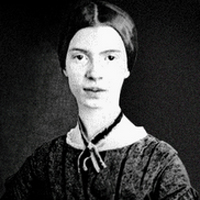To fight aloud, is very brave by Emily Dickinson: Summary and Analysis
Emily Dickinson describes the predicament of man in terms of the fight. The images in the poem are from war. Emily Dickinson's tragic sense is vividly reflected in the poem. The poet celebrates the heroism of unnoticed inner clash.

Emily Dickinson (1830-1886)
Man has to fight in the battle of life. It takes tremendous valor to fight the sorrows of life. To fight vigorously is indeed brave, but braver it is to charge the heart with woes. Whether man wins or loses the battle is nobody's concern. Those who win, like those who fall in the battle of life go unnoticed. The man simply believes in the fight itself rather than in its outcome. The man who dies in the battle is not regarded as a patriot. The world at large is indifferent to his fate. It has no word of praise for the courage with which he fights. Like the angels moving in a "plumed procession" rank after rank and with rhythmic steps and uniforms of snow, men believe simply in their march through life.
The outer battles of life are visible, but the inner battle of thoughts and woes are unnoticed and overlooked by the world. The changes of life hit everyone, some can endure the blow of the wave whereas some surrender and collapse. Still, both are fighters of life and they fought bravely. No one can see their bravery. And the most important thing is that they both are neglected. The speaker strongly believes that the inner conflicts of everyone are as genuine as the physical fight that we see and praise. To overcome the battle of inner thoughts is more of a victory than to die for one’s own country in the battle.
But it does not necessarily mean that she denies the bravery of the warriors who fight aloud. It is just she praises the one “who charge within the bosom the Calvary of Woe” are even more gallant than those who “fight aloud”. The speaker cherishes the sort of quiet and unnoticed life. To live silently, to work for a cause peacefully and die without high regard is more honorable for the speaker.
Despite all the disasters people face in life, they still have faith in the angels. The angels are cold and perhaps aloof. The warriors of physical battles are neglected by the nations. Though everyone is same in terms of inner battle, none help each other to overcome the internal war, instead they hope the angels will help them.
Cite this Page!
Shrestha, Roma. "To fight aloud, is very brave by Emily Dickinson: Summary and Analysiss." BachelorandMaster, 8 Jan. 2018, bachelorandmaster.com/britishandamericanpoetry/to-fight-aloud-is-very-brave-summary-analysis.html.
Related Topics
Much Madness is Divinest Sense: Analysis
Renunciation: Summary and Analysis
Because I could not Stop for Death: Analysis
I Heard a Fly Buzz: Summary and Analysis
After Great Pain, a Formal Feeling Comes: Analysis
Success is Counted Sweetest: Summary and Analysis
I taste a liquor never brewed: Summary and Analysis
A Bird came down the Walk: Summary and Analysis
Hope is the Thing with Feathers: Analysis
I like to see it lap the Miles: Summary and Analysis
I had something that I called mine: Analysis
If I should Die: Summary and Analysis
I'm Nobody! Who are you?: Summary and Analysis
These are the days when the Birds come back
What Inn is this: Summary and Analysis
Exultation is the going: Summary and Analysis
Of Bronze-and Blaze: Summary and Analysis
A Clock Stopped: Summary and Analysis
I felt a Funeral, in my Brain: Summary and Analysis
Safe in their Alabaster Chambers: Analysis
There's a certain Slant of light: Summary and Analysis
I like a look of Agony: Summary and Analysis
Bring me the sunset in a cup: Summary and Analysis
The day came slow-till Five o'clock: Analysis
 |
bachelorandmaster.com |